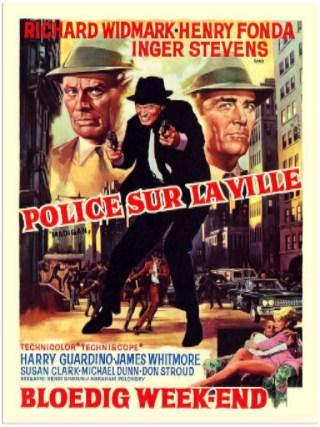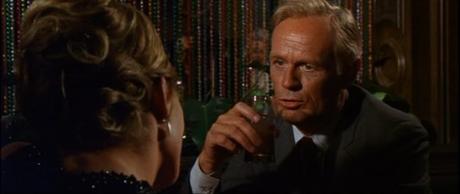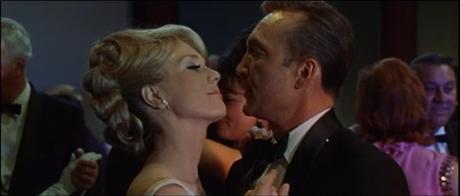
A little like the western, the crime story has remained one of the constants of genre filmmaking down the years. Any story which involves elements of crime has plenty of drama built-in so it's only natural that cinema should take advantage of that. The western had long been the dominant genre in both cinema and TV until its gradual decline in popularity began in the mid-60s, and it was at that point that the crime yarn started to edge its nose in front. The detective/cop thriller really came into its own in the 1970s on the big and small screen. Madigan (1968) was one of those pictures which played a significant part in the flowering of the genre at that time, even inspiring its own, short-lived, television series a few years later.
Dan Madigan (Richard Widmark) is a New York detective, a veteran with a variable reputation. It could be said that his superiors regard him with a mixture of respect and suspicion. He has a distinguished record on the job but also the kind of casual attitude towards rules and regulations that rubs some up the wrong way. One of those is Commissioner Russell (Henry Fonda), the dry, straight arrow who has to try to juggle his police background with the political demands of his position. The ambivalence of Russell is borne out by the punchy opening section which sees Madigan and his partner, Rocco Bonaro (Harry Guardino), screw up what ought to have been a routine bust. The upshot is a dangerous suspect manages not only to elude arrest, but also relieves the two bulls of their service revolvers. This sets up the situation which dominates the rest of the film: the search for the dangerous fugitive and the consequent pressure placed on the shoulders of Madigan and Bonaro to atone for their initial carelessness before matters deteriorate further. Allied to this is the personal stress experienced by both Madigan and Russell, in the case of the former due to strained relations with his wife (Inger Stevens) while the latter finds his almost puritanical approach to life tested by the actions of colleague and childhood friend Chief Inspector Kane (James Whitmore).

One of the regular visitors and contributors to this site (you'll know who you are) just recently remarked that he doesn't see himself as one who subscribes to the auteur theory of filmmaking, and also cited Don Siegel as one of his favorite directors, comments which provided me with food for thought. In the past I was reluctant to embrace the notion of the auteur, feeling that it was largely an affectation of the more academic critics and too pat to be applied to so collaborative a task as making movies. Another of our regulars (who will probably recognize himself too) challenged me on this position and made me wonder if perhaps my own interpretation wasn't too narrow. To cut a potentially long story short, I found myself reassessing my view and coming to the conclusion that the notion of the auteur in cinema needn't necessarily be a restrictive one. I'm more comfortable now with the term in a broader sense, both in the way it's used and the people it may be applied to. In short, I think Don Siegel can be referred to as an auteur.
A director such as Siegel is a product of the studio system, working his way up through the ranks and honing his talents in a variety of roles on a range of genre pieces. As I said, I've moved away from thinking of an auteur as some domineering presence impressing his vision relentlessly on the films he works on. Instead, I've come round to the idea of the auteur as the most influential member of the creative assemblage, someone whose distinctive mark can be discerned on the finished piece. And I think this can be said of Don Siegel; it's common to consider him primarily as an action director but there's usually something of himself, or at least his interests, on view in his films. It's difficult not to be aware of his examination of authority and authority figures throughout his career, and Madigan is no exception.

Siegel's touch is visible enough to me, and he's helped in leaving it there by the talents of accomplished cameraman Russell Metty, the writing of Abraham Polonsky and Howard Rodman, and a cool lounge score by Don Costa. While those individuals were all busy pooling their abilities to achieve the best results possible, it appears producer Frank Rosenberg's contribution was less welcome. On the other side of the camera, both Widmark and Fonda gave the kind of coolly assured performances one would expect of actors with their experience and talent. Widmark's trademark air of ambiguity is a good fit for the detective who treads the fine line of legality with the sure-footedness of a tightrope walker. Similarly, Fonda does stiff and prissy very well, and it's all the more effective when the audience is aware both of his internal conflicts and the hypocrisy of his overt moralizing. Inger Stevens had the meatiest of the female roles (although Susan Clark and Sheree North had parts of note too) and runs with it, getting across her dissatisfaction and frustration very successfully. In support, there's uniformly good work done by Harry Guardino, Steve Ihnat, James Whitmore and Don Stroud.
Madigan has been available on DVD from Universal for a good few years now. The UK release I own presents the movie in anamorphic scope and uses a good print. Colors are strong and there's good detail in the image. Additionally, there is no noticeable damage on view. Sadly, there aren't any extra features offered, but I guess the film is the main thing and it does look very nice. I've always been a fan of detective/cop thrillers, regardless of whether they're films, television shows or stories on the printed page, and Madigan is a prime example of good they can be. It's tough, pacy, entertaining and has enough human interest to raise it above more mundane, one-dimensional fare. All told, it's a polished piece of work from a top director, cast and crew. Recommended.
